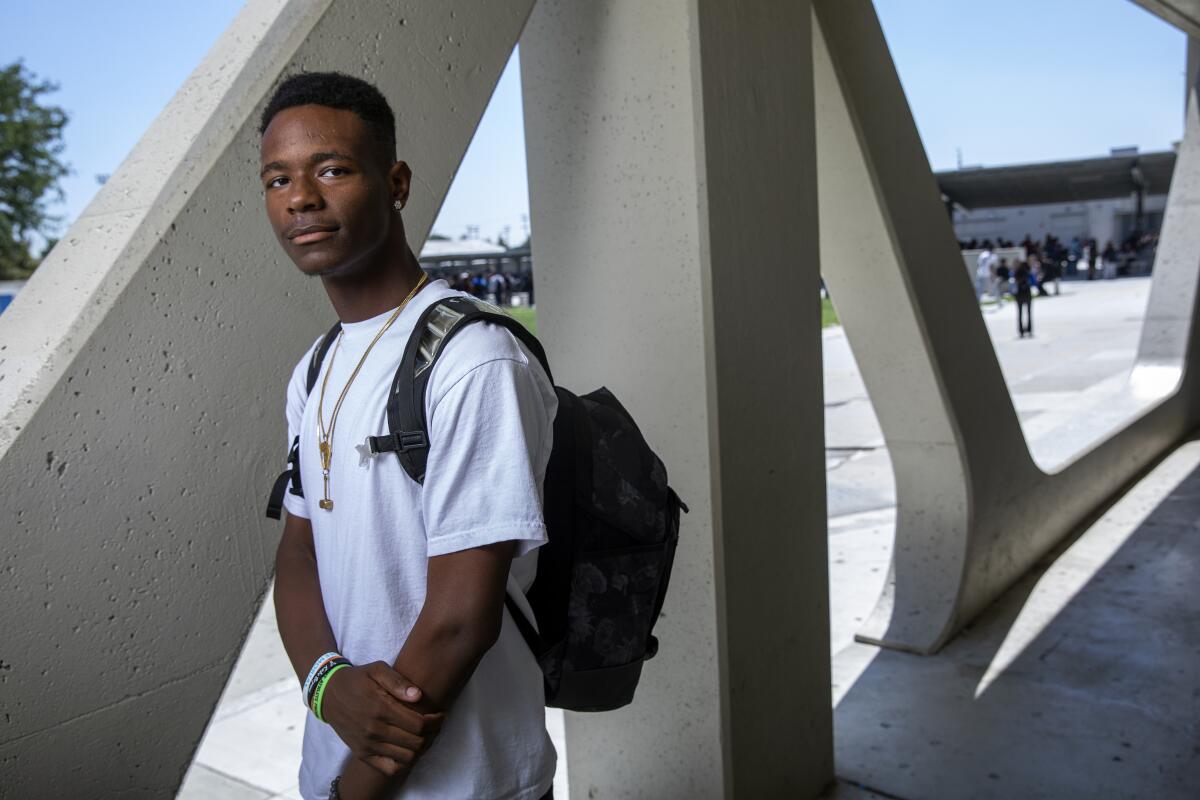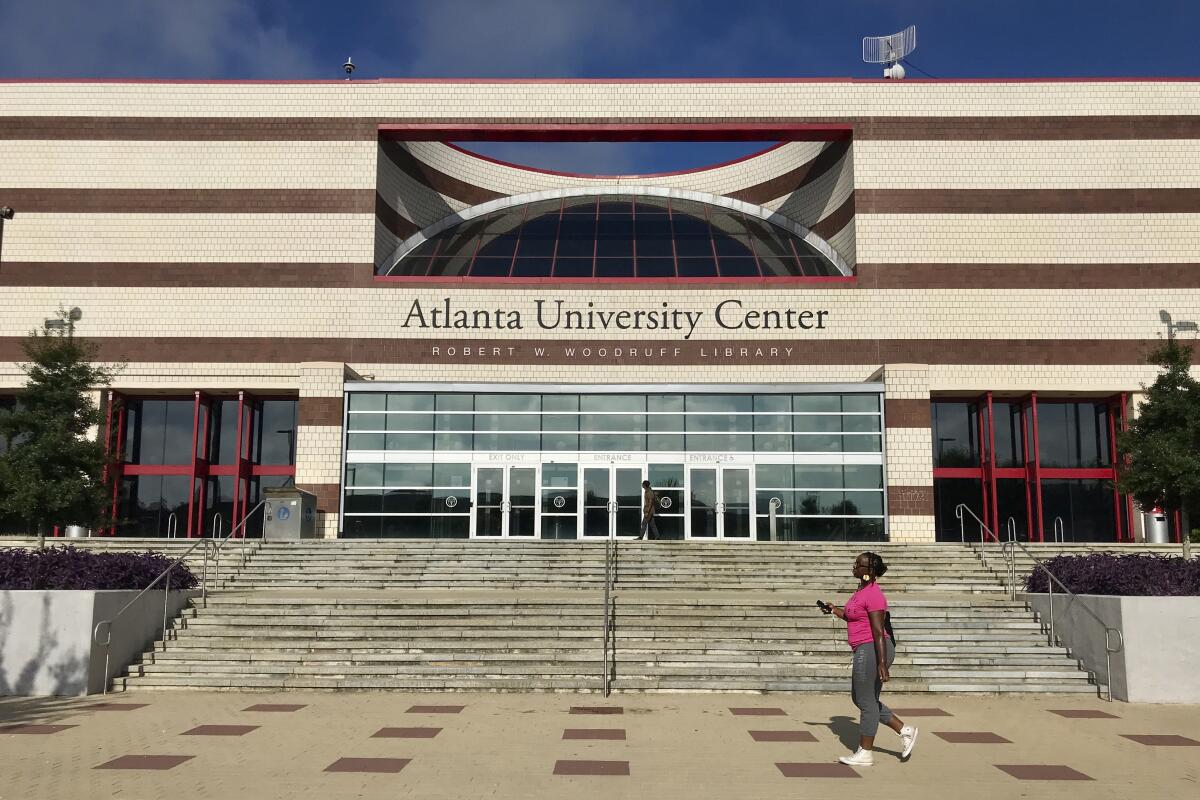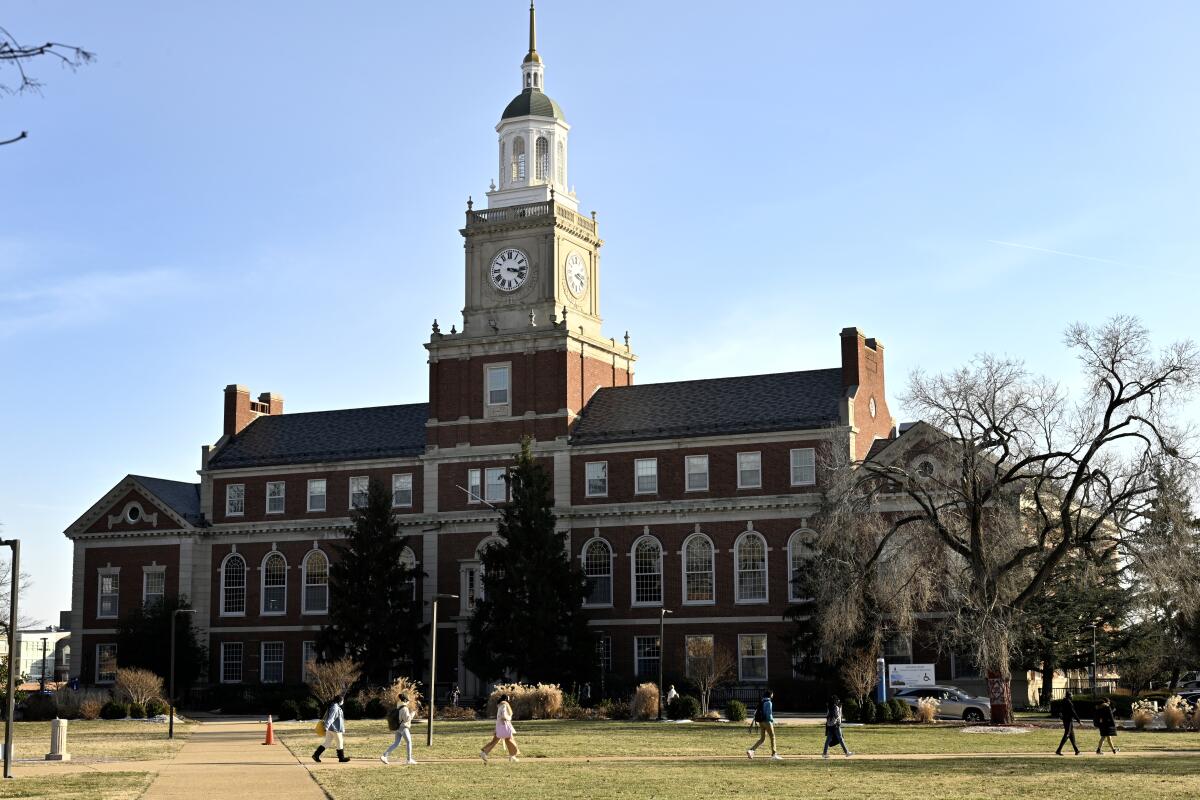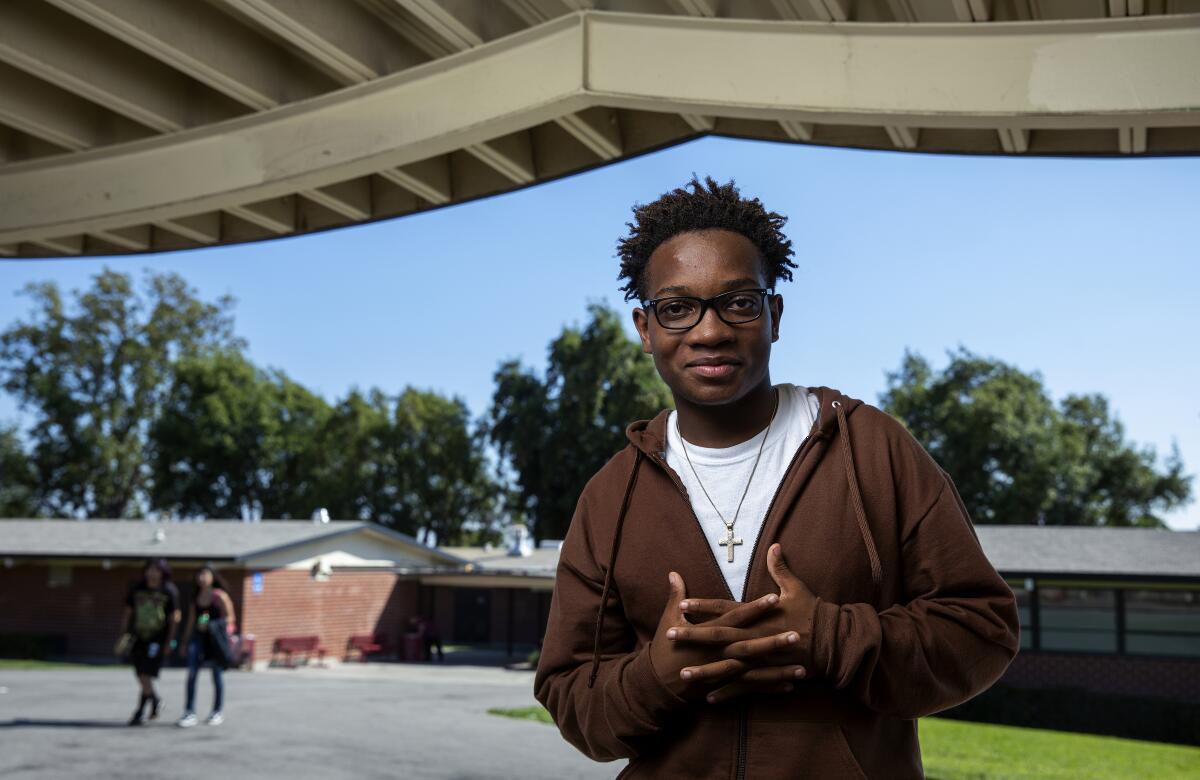HBCUs brace for flood of applications after Supreme Court affirmative action decision

- Share via
WASHINGTON — College presidents and admission experts are expecting a significant increase in applications at historically Black colleges and universities following this summer’s Supreme Court decision outlawing race-based affirmative action policies.
At a time of heightened social divisions with race relations at the forefront, school administrators say the conservative-majority court’s ruling opens a door for HBCUs to fill a gap for students and their families seeking an educational experience in which Black identity and culture are celebrated.
“We are anticipating that over the next three years, we will likely see an increase in our applications, somewhere between 50[%] and 100% as a direct consequence of this decision,” said David Anthony Thomas, president of 156-year-old Morehouse College, a men’s HBCU in Atlanta whose alumni include the Rev. Martin Luther King Jr.
Thomas said the institution has already seen an uptick in applications in recent years following protests in response to the May 2020 murder of George Floyd by a Minneapolis police officer. According to data Morehouse shared with The Times, the school received about 2,300 applicants for its incoming class in 2018, a number that grew to 3,200 applicants in the cycle immediately after the protests. For its current freshman class, Morehouse received 5,200 applications, a 122% increase compared to 2018.
At Howard University in Washington, applications have grown from about 11,600 in 2013 to more than 32,000 in 2023, a 175% increase, according to data shared with The Times and statements from school officials. Undergraduate enrollment increased from 6,500 in 2019 to almost 10,000 in 2023.
Melanie Carter, associate provost and director of the Center for HBCU Research, Leadership, and Policy at Howard University, said that following the Supreme Court decision on affirmative action, she expects that not only will applications increase, but that more high-achieving students will apply.
“I think we will see an increased number of students, particularly those students who are in the top percentages of their graduating classes who will opt for HBCUs,” Carter said. “I think that population will [apply], I think they’ve had enough of this questioning of their competitiveness and their qualifications for entry.”

At co-ed Clark Atlanta University, another HBCU, President George T. French Jr. echoed Carter’s assessment. The school received 31,000 applications for fall 2023 and had places for about 1,200 students in the incoming class.
“I told them to shut down the [application] portal. It was just too many to consider,” French told The Times. He expects that in the upcoming cycle, the first since the court’s decision, they could receive 50,000 applications.
French said the kind of student applying to study at Clark is also changing.
“We have seen the quality of students increase dramatically. For example, in 2019, the average GPA of our incoming class was 2.8. The average of this class [in 2023]: 3.6,” French said. “So, that is going to be a major influx of students who are well prepared for university.”
While some schools are fielding an increase in applications, others are seeing interest translate into an uptick in funding.
In Los Angeles, the Charles R. Drew University of Medicine and Science met its five-year fundraising goal of $75 million 2½ years early and has set a new target at $90 million, its president, Dr. David M. Carlisle, told The Times.
Because the school was founded in 1966 — the 1965 Higher Education Act defines HBCUs as “any historically black college or university that was established prior to 1964” — the university does not have official federal designation as an HBCU. But it has received White House funding for HBCUs because of its history of educating Black students.
“We are a small, private university, and as such, we offer students a much more nurturing environment than they get from many larger higher education institutions,” said Carlisle, who noted that after CDU gained approval to start its own medical school last year, it received nearly 1,000 applications for only 60 places.
The renewed interest follows decades of decline in the share of Black students enrolling in HBCUs, which were established at a time when racial segregation laws prevented Black students from attending white-only schools.
In 1976, 18% of Black college students across the country enrolled at HBCUs, but by 2014 that had declined to just 8%, according to data from the National Center for Education Statistics, a federal agency. That number rose to 9% in 2021, the latest figures show.
Meanwhile, colleges and universities across the country have seen a decline in enrollment from pre-pandemic levels, with undergraduate enrollment declining by 15% between 2010 and 2021, and much of the decline occurring during the pandemic, according to a May 2023 report by the agency.
The growth at HBCUs has been met with support from the Biden administration, whose vice president, Kamala Harris, is a graduate of Howard University — a first for the nation. The administration’s American Rescue Plan has provided $2.7 billion in funding for the nation’s 100 HBCUs.
Philanthropists have also donated to HBCUs in recent years, with Mackenzie Scott contributing hundreds of millions of dollars to schools, including $20-million gifts to Morehouse and Spelman colleges, and $15 million to Clark Atlanta. Charles R. Drew University of Medicine and Science also received $20 million from Scott, the school’s largest donation ever.

Admissions experts interviewed by The Times said the rise of the Black Lives Matter movement in the aftermath of the 2020 killing of Floyd supercharged interest in HBCUs.
“I could literally see overnight the additional growth,” said Theresa Price, who founded the Black College Expo in California in 1999 as a response to Proposition 209, which ended affirmative action in the state. “I heard students saying: ‘I want to go to a Black college.’ I hear that a lot now when I did not hear that years ago.”
The organization also grants scholarships to students to attend college, and Price said a greater share of them are going to students attending HBCUs.
“When we first started, I would say 1 in every 10 scholarship [recipients] maybe will go to an HBCU,” she said. “Now, it is like 1 in every 3. It has really changed.”
The post-Floyd surge was a result of a growing number of Black families “prioritizing safety and cultural relevancy” for their children, said Shereem Herndon-Brown, co-author of “The Black Family’s Guide to College Admissions.”
“Given the fact that Black students are celebrated, not tolerated, at HBCUs, I think that there are families who are saying, ‘I want my kid to feel good about himself, be around other students where they are not the only one,’” Herndon-Brown said. “I think even more now with the SCOTUS decision, that may force people’s hands a little bit.”
The Supreme Court‘s June ruling on affirmative action doesn’t prevent applicants from writing about their race and social inequity in college essays. But many saw the decision as a signal about the lack of acceptance Black students could feel in elite, predominately white institutions.
“As we move into this post-affirmative-action phase of higher education ... people will read into it a message that maybe I should go to a place where I am gonna feel like I am truly valued,” Thomas said. “And that is HBCUs.”

Until recently, Donavan Dennis-Plesant, a Black senior at Pomona High School, had been on the fence about where he would attend college. But after a tour of HBCUs this summer coordinated by Price’s organization, Dennis-Plesant has set his sights on Bowie State University in Maryland. He plans to study business.
“From an HBCU, I can get that one-on-one with professors and peers,” Dennis-Plesant, 16, told The Times. “There are people that look like me and understand what I am going through, how I act and interact.”
Ozze Mathis of Lynwood High School said he learned about HBCUs from a counselor at an after-school program who had attended Florida A&M University.
“I was like, ‘This sounds dope, to go to an HBCU,’” said Mathis, who is Black.
After participating in the same summer tour organized by Price, he said he would be applying to Norfolk State in Virginia, his top choice for its mechanical engineering program.
“I want to get more experience with my culture and be more around my own environment,” said Mathis, 17. “HBCUs aren’t party schools. There are actually good programs at that college and [that] will help you with milestones in your life.”
Yetunde Daniels Rubinstein, owner of Arising Educational Consultants and a former college counselor at Brentwood School in Los Angeles said that at HBCUs, Black families “feel like there is a level of safety, physical and psychological, that all parents really want.”
“They see that HBCUs are uniquely invested in that in a way that [predominantly white institutions] just may not understand how to do,” she said.
But HBCUs have long been underfunded, and Daniels Rubenstein and other experts say more needs to be done so that increasing interest translates to greater enrollment capacity.
“I hope as much as there is this wonderful value being overlaid on the HBCU experiences, that we make sure they are getting the funds and the human resources to continue doing this great work that we now all expect,” she said.
In September, U.S. Secretary of Education Miguel Cardona and Secretary of Agriculture Tom Vilsack wrote to 16 governors highlighting a more than $12-billion funding disparity between land-grant HBCUs and land-grant non-HBCUs — schools founded on federal lands under the Morrill acts of 1862 and 1890 — in those states. In Tennessee alone, its only land-grant HBCU had been underfunded by $2.1 billion over the last 30 years, the Biden administration said in a letter to Republican Gov. Bill Lee.
“Unacceptable funding inequities have forced many of our nation’s distinguished Historically Black Colleges and Universities to operate with inadequate resources and delay critical investments,” Cardona said.
The letter was applauded by Carter of Howard University.
“We can’t continue to operate on shoestring budgets that don’t adequately support our institutions, their growth and development,” she said. “We are at a crossroads where those things can’t wait any longer.”
More to Read
Get the L.A. Times Politics newsletter
Deeply reported insights into legislation, politics and policy from Sacramento, Washington and beyond. In your inbox twice per week.
You may occasionally receive promotional content from the Los Angeles Times.









